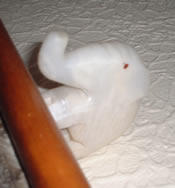The other day I discovered how to add subtitles and speech bubbles to my videos on YouTube. I’ve added them to my latest video in Spanish:
So you can now have the speech bubbles with the dialogue in Spanish, the subtitles in English, or both, or neither. It was quite a fiddly and laborious process to add the speech bubbles, but relatively straightforward to add the subtitles as I used the timing from the speech bubbles (annotations).
Today I saw a post on Fluent in 3 months about this very topic with suggestions on how to do it more easily. This got me thinking and I realised that another way to add the subtitles is to record the sound of a video using Audacity, and to get the timing of each bit of speech from there. You have to have a transcript of the dialogue first, of course, though that wasn’t a problem as I always prepare such transcripts when I make the videos.
I used this method to add subtitles to my video about eel-infested Austrian hovercrafts, and it worked well. I’ve also started adding speech bubbles, but haven’t quite finished that yet.
Half the dialogue is in English and half in German, and the subtitles are in English for the German bits and in German for the English bits. I thought it would be a useful exercise for me to try to translate the English bits into German. If you spot any mistakes, please let me know.
This is what the file for the subtitles (captions) looks like:
0:00:00.0,0:00:00.4
Hello
0:00:00.8,0:00:01.3
Hallo
0:00:01.6,0:00:02.7
How are you?
0:00:03.1,0:00:05.1
Es tut mir leid ich verstehe nicht.
0:00:05.5,0:00:07.0
Spechen Sie über ein Gatter?
0:00:07.4,0:00:10.8
Sprechen. Sie. Englisch?
0:00:11.2,0:00:15.2
Yes, of course. Do. You. Speak. German?
0:00:15.6,0:00:20.1
Äh, meinen Sie damit, daß Sie Englisch sprechen,
und fragen Sie mich, wenn ich Deutsch spreche?
0:00:20.6,0:00:23.4
Yes. You can understand a little German?
0:00:23.7,0:00:28.5
Ja, ich habe in der Schule Deutsch gelernt und
kann ein wenig verstehen, aber ich kann nicht sprechen.
0:00:28.8,0:00:31.8
Seit sehr viele Jahre habe ich es nicht benutzt
und ich bin etwas aus der Übung,
0:00:31.9,0:00:33.8
aber jetzt fängt es zurückzukommen.
0:00:34.1,0:00:35.9
I understand. What’s your name?
0:00:36.3,0:00:39.5
Mein Name? Ich heise Jane. Wie heißen Sie?
0:00:39.9,0:00:42.1
My name is Klaus. Where are you from?
0:00:42.5,0:00:44.9
Ich komme aus Birmingham. Und Sie?
0:00:45.3,0:00:48.0
I’m from Vienna. What do you do?
0:00:48.3,0:00:50.0
Ich bin Bibliothekarin, und Sie?
0:00:50.4,0:00:53.2
I’m a Danube hovercraft company captain.
0:00:53.5,0:00:55.6
Mann, das ist ein ziemlicher Zungenbrecher!
0:00:56.0,0:00:59.5
Genießen Sie arbeit als
Donauluftkissenfahrzeuggesellschaftskapitän
zu tun?
0:00:59.8,0:01:01.4
Yes. I enjoy it very much.
0:01:01.8,0:01:04.1
But the hovercrafts are often full of eels.
0:01:04.7,0:01:08.4
Ja, ich weiß. Diese verteufelten Aale kommen überall hin.
0:01:08.8,0:01:11.4
Yes. It was nice talking to you.
0:01:11.7,0:01:15.0
I must get back to the hovercrafts. Goodbye.
0:01:15.2,0:01:17.7
Ja, es war schön mit Ihr zu reden.
0:01:18.1,0:01:20.7
Viel Glück mit dieser Aal-verseuchten luftkissenfahrzeugen.
0:01:21.2,0:01:21.7
Auf Wiedersehen.
